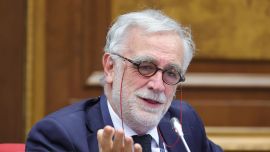Inflation slowed to four percent last month – the lowest monthly rate since President Javier Milei took office last December.
The figure – the lowest monthly rate in two-and-a-half years – confirms that consumer prices are continuing to decelerate, though it dashed government hopes of a rate below four percent.
According to data from the INDEC national statistics bureau, prices have risen by 87 percent so far this year, with annual inflation standing at a staggering 263.4 percent.
The most recent edition of the Central Bank’s REM survey of market expectations had forecast a rate of 3.9 percent, though the Buenos Aires City government’s statisticians reported a July inflation rate of 5.1 percent last week.
July’s increases were headed by restaurants and hotels (6.5 percent) and alcoholic beverages and tobacco (6.1 percent) due to hikes in cigarette taxation, followed by a six-percent rise in housing, water, electricity and other fuels owing to updates in public service billing and higher rents.
But the biggest impact came from food and beverages (despite an increase below the average of 3.2 percent where the seasonal factor of fruit and vegetables played a large part), said INDEC, except in the northeast where housing, water, electricity and other fuels hit harder.
The lowest July increases were registered in garments and footwear (1.6 percent) and transport (2.6 percent).
Core inflation (excluding seasonal and regulated prices) was 3.8 percent with the seasonal prices outweighing the regulated with 5.1 percent for the former (mainly due to fruit and vegetables) and 4.3 percent for the latter.
In a statement, the Economy Ministry highlighted a third consecutive month of decelerating prices compared to the same month last year, adding that “general inflation, besides being the lowest of the year, was the lowest since January 2022."
It said INDEC’s data was consistent “with a deepening of the disinflation process.”
"July's inflation is a great figure for the government, considering that it is not only the lowest of the current administration, but also the lowest monthly inflation since January 2022,” agreed Lautaro Moschet, an economist with the Fundación Libertad y Progreso think-tank.
President Javier Milei’s government has applied a drastic austerity programme with the aim of achieving "zero budget deficit" by the end of 2024 to tame chronic inflation.
In December, when self-described “anarcho-capitalist” leader took office, monthly inflation leapt by 25.5 percent after Milei devalued the peso by more than 50 percent. The move, in addition to severe budget cuts, strangled purchasing power.
In January, the government reported its first monthly budget surplus in nearly 12 years. But critics say Milei's few wins have come at the cost of the poor and working classes.
Economist Ricardo Delgado of the Analytica consultancy said Wednesday it was too soon to declare an end to rampant inflation.
"There is a slowdown in inflation as a result of several issues such as economic activity at very low levels. Recession always produces a drop in inflation," he told Radio Continental.
Nevertheless, Milei administration officials are increasingly bullish about the slowing of inflation. Presidential Spokesperson Manuel Adorni said Wednesday that the issue is, “from a technical point of view,” under control.
“For us, inflation is an issue that is technically over, because we have done everything that had to be done to solve it. What remains is time to see this inflation collapse,” he declared confidently at his morning press conference.
Argentina’s economy contracted by 5.1 percent in the first quarter of the year, driven by a slowdown in construction and manufacturing. According to the Cámara Argentina de la Mediana Empresa industry group, retail sales fell 15 percent year-on-year in July and 17 percent so far this year.
Social security data shows that more than 600,000 people have stopped contributions, likely because they lost their jobs or entered the informal market. The government admits to 115,000 proven job losses in the private sector, but assures that a rebound came in June.
Poverty stands at 55.5 percent, according to the last report by the Catholic University of Argentina’s Social Debt Observatory.
The IMF in June sharply downgraded its 2024 economic outlook for Argentina, saying it expected a contraction of 3.5 percent.
– TIMES/NA/AFP
























Comments